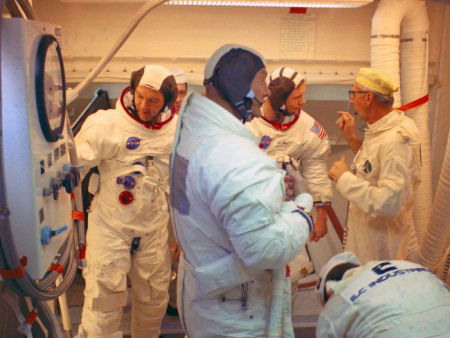Today, Monday 3 May, 2010, Guenter Wendt died from a stroke at the ripe old age of 85 at his home in Florida. Wendt became famous among astronauts as the Cape Canaveral launch pad leader - or 'pad fuhrer', as he became known - whose attention to detail and knowledge of rocket engineering meant that if he said it was safe to launch then it was safe to launch. Wendt was always the last person on Earth to wave the astronauts goodbye.
Although born and educated in Berlin, Wendt's father was actually an American and in 1949 he was determined to go seek his fortune in the US. By 1955 he had his American citizenship and was working for McDonnell Aircraft Corp as a rocket engineer. His particular mixture of skills and interests meant that he seems to have created the post of pad leader for himself.
If space was the final frontier it was going to be reached with frontier science; and that meant accidents - lots of accidents. The aim of such experimental failures was not only to make the rockets better but safer too. To this end Wendt worked on both the Mercury and Gemini projects.
 He recalls how he would spend his time sitting in a boat on the river contemplating all the possible 'what ifs' of how the smallest thing could lead to catastrophe. He took the safety of each mission as his personal responsibility - until that responsibility was taken away from him.
He recalls how he would spend his time sitting in a boat on the river contemplating all the possible 'what ifs' of how the smallest thing could lead to catastrophe. He took the safety of each mission as his personal responsibility - until that responsibility was taken away from him.For the Apollo 1 mission NASA had changed contractors and Wendt was out of a job. On 27 January 1967, Wendt learnt of the pad fire that destroyed the command module and claimed the lives of all the astronauts inside. "I remember the sudden weight I felt in my shoulders," he described in his book. "I slumped down in my chair as if I weighed a thousand pounds. It seemed the blackest moment of my entire life and I cried at their loss," Wendt revealed. The other astronauts demanded Wendt be reinstated and he never looked back, retiring over 20 years later in 1989.
What struck me in reading the lengthy transcripts of interviews Wendt gave some ten years ago is that his story was also that of hundreds of other scientists. Being a frontier scientist does not mean having to be a headline scientist, and although out of the limelight the work is just as important, just as exciting and just as dangerous. To be a hero to just a few is also no less heroic.





Comments